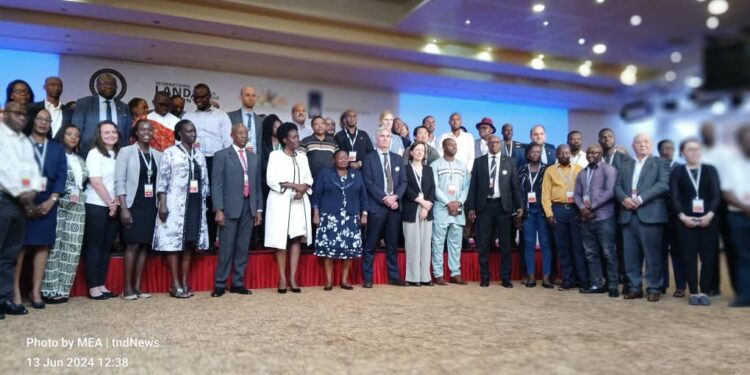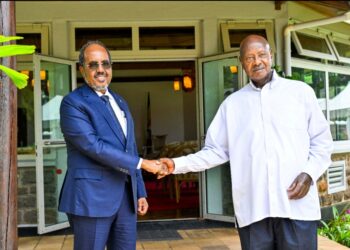Munyonyo, Kampala | Uganda hosted the 2024 Land Rights Learning Week, which brought together delegates from over 35 countries worldwide at the Speke Resort Hotel in Munyonyo, Kampala.
Prior to meeting in Munyonyo, delegates travelled to Butaleja and Dokolo districts, where they interacted with the community, the majority of whom faced land-related challenges.
At least 50 delegates led by the host organisation, the Land and Equity Movement in Uganda (LEMU) and the National Land Coalition Uganda, all members of the International Land Coalition, interacted with Okwongodul sub-county residents and local leaders.
Before Prime Minister Robinah Nabbanja officially closed the week-long event, Judith Nabakooba, Minister of Lands, Housing, and Urban Development, said in a brief statement that she (the Premier) “supports the land sector so much.”
President Museveni, according to Nabakooba, has brought about peace and stability, which has made it possible for the government to collaborate with civil society and development partners.
“And that is why this team chose Uganda as a host for this conference because of the good move but also in support of the pertinent issues,” Nabakooba said, adding that the delegates shared challenges and also lessons were learned.
Along with lessons, she informed the Premier that practical strategies for improving land governance to inform policy and legal reviews between countries had been shared.
“We have discussed how to achieve successful reforms in light of the SDGs, the success and failures of partnerships, the need for coordination mechanisms to be established by governments and the role played by the civil society organisations, gender transformative approaches to increase the number for women in land governance, sustainable self-financing….”
Theresa Auma (PhD) is the Executive Director of the Land and Equity Movement of Uganda. Her organisation, the National Land Coalition, and other local partners collaborated with Uganda’s Ministry of Lands to organise the “Learning Week.”
She stated that there is a conducive environment for collaboration, citing the success of their collaboration with the Ministry of Lands.
The LEMU Executive stated that the level of cooperation demonstrated during field visits to Dokolo and Butaleja, as well as at the national level, was impressive, telling the well-attended event that Uganda has a lot to learn from other countries.
Dr. Mike Taylor, Director of the Secretariat of the International Land Coalition, explained why the network is in Uganda. He went on to say that the Coalition promotes people-centered land governance that benefits the community.
Taylor urged Uganda’s government to set aside 1% of its national budget for land governance. “We give you our assurance as partners, as allies that we will work together with you; we will continue to work together with you in making this real.”
Prime Minister Nabbanja informed the delegates that she had conveyed greetings from President of the Republic of Uganda Yoweri Kaguta Museveni. She said the President was aware of the conference.
Nabbanja was informed that “this historic exchange programme” brought together a number of participants from approximately 35 countries, representing governments and non-state actors working within land governance institutions, as well as facilitators from national land coalitions and multi-stakeholder platforms.
“As you all know, multi stakeholder partnerships and partners play an important role in advancing sustainable and equitable land tenure and governance by fostering collaborations and co learning as well as pulling expertise and resources with different stakeholders. It also supports the governments through sharing responsibilities to be able to achieve the political pledges made on land governance,” the Prime Minister said.
“The Uganda government where I work as the Leader of Government Business pledges to its people, for example, on the legal issue of customary movement of land tenure in terms of security. With our small resource envelope, we may not be able to put up resources and so you, the development partners who work together with us, can help us achieve this.”
The government of Uganda, Nabbanja said, through partnerships has issued over 82,000 legal documents to customary land owners. “And of course we know that here in Uganda the land belongs to the people.”
She told the delegates that she receives reports as Prime Minister “on a daily basis”. The reports relate to forced evictions, land conflicts and administrative boundary disputes among others, adding that it [government] also requires responses which may sometimes call for involvement with multi stakeholders’ intervention.
“The NRM government is committed to resolving the ongoing land disputes and improving land administration and management systems. We’ll ensure that illegal land evictions and land transactions are conducted transparently and legally. Therefore, the theme of this conference, which is governments and civil society organisations’ partnerships in land governance global learning 2024, is dear to me, to the UN Agenda 2030 for sustainable development. The 2015 Africa Women’s Kilimanjaro Declaration, the 2009 Framework and Guidelines on land Policy in Africa and Voluntary Guidelines on responsible Governance pertaining land, fisheries and forests with the context on national food security of 2012 which must be implemented to bring change in our peoples’ lives.”
“Nearly all countries represented here have national land policy. Uganda developed a national land policy whose goal is to ensure an efficient, equitable and optimal utilisation and management of Uganda’s land resources for poverty reduction, wealth creation and of our socioeconomic development.”
She stated that a number of inter-sectoral organisations, including academics, special interest groups, and civil society organisations, were responsible for implementing national land policies. “This has caused positive results,” she said, adding that as a result, the government has always fostered partnerships with civil society organisations in the land sector through creating an enabling environment, carrying out knowledge exchange, among others.
The Global Land Agenda and the AU Land Governance Strategy 2023–2032 are two examples of regional and international land frameworks that the government is prepared to support, she declared.
She congratulated the delegates who travelled upcountry to Butaleja and Dokolo on behalf of Uganda in order to witness the “positive impacts of Uganda’s partnerships in the land sector”. These partnerships, she said, compelled the government for economic growth and registered land into the market economy.
“Without anyone’s livelihoods being disturbed in Kakumiro district – my home district – where I am a Member of Parliament – where government and partners are resolving historical justice and returning land to genuine owners after years and years of being tenants..”
She said that the governments should be able to implement significant changes in the land sector with the aid of the lessons learned during the week-long engagements in Uganda.
Supporting land reforms, the Premier said gears towards reducing poverty in rural and urban areas while using our traditional institutions. “The generalisation and upgrading of the tenure security for tenants on registered land in rural areas and urban informal settlement enhance their productivity and stop illegal evictions. Reforming our land markets provide partnerships, access to land for the poor to use optimally for transformational growth.”
“Promoting land administration for good governance and conflict management including resolving land disputes in the shortest possible time.
“There is a need to improve land acquisition laws and procedures, and dealing with corruption in the land sector. Land corruption hurts the poor and the vulnerable the most.”
Uganda’s Nabbanja said there is also a need for countries to improve governance issues associated with sustainable land use practices that protect our critical ecological systems, and selecting appropriate technologies for surveys and mapping.
“….I want to take this opportunity to remind you that the land sector is key in championing the development of any country,” she told the delegates, adding that the deliberations will inform policies, laws and interventions to the sector, to promote transformation of our countries.
“Please, take your time to visit Uganda, to see our vast flora and fauna before you return to your respective countries.”
Do you have a story in your community or an opinion to share with us: Email us at editorial@watchdoguganda.com













